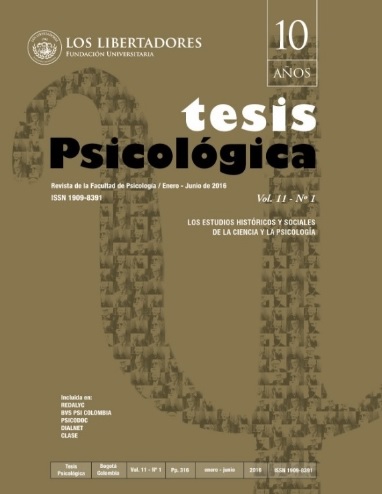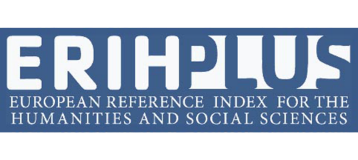La Inteligencia: Una exploración sobre algunos aspectos contemporáneos
Palabras clave:
Inteligencia, factor g, personalidad, psicometría, psicología evolutiva.Resumen
En el presente artículo se hace una revisión general de investigaciones y debates contemporáneos alrededor del constructo denominado inteligencia; para esto, se propone abordar esta exploración desde tres aspectos: Primero, se hablará sobre cuestiones relacionadas con su medición y su fundamentación teórica, posteriormente, se abordará la creciente relación entre inteligencia y personalidad, por último, se mencionarán algunas discusiones alrededor de la existencia del factor general de inteligencia (Factor g) y su carácter evolutivo. Se concluye, que el concepto de inteligencia seguirá generando nuevas revisiones no solo desde lo psicológico sino desde lo social y lo cultural, además, es de esperar que las investigaciones sean cada vez más multidisciplinares debido a que la inteligencia ha sido, es y será un concepto relevante tanto en la comunidad científica, como en la sociedad, en general, debido en parte a que es un constructo que de cierta manera nos caracteriza como especie.Descargas
Los datos de descarga aún no están disponibles.
Referencias
Baudson, T., & Preckel, F. (2013). Intelligence and Creativity. En K. Kim, J. Kaufman, J. Baer, & B. Sriraman. (Eds.), Creatively Gifted Students are not like Other Gifted Students (pp. 181, 212). New York: Springer.
Beauducel, A., Liepmann, D., Felfe, J., & Nettelnstroth, W. (2007). The Impact of Different Measurement Models for Fluid and Crystallized Intelligence on the Correlation with Personality Traits. European Journal of Psychological Assessment, 23(2), 71-78. doi: 10.1027/1015-5759.23.2.71.
Benisz, M., Dumont, R., & Willis, J. (2015). From Psychometric Testing to Clinical Assessment: Personalities, Ideas, and Events That Shaped David Wechsler’s Views of Intelligence and Its Assessment. En S. Goldstein et al. (Eds.), Handbook of Intelligence: Evolutionary Theory, Historical Perspective, and Current Concepts (pp. 163-177). New York: Springer. doi:10.1007/978-1-4939-1562-0_12.
Benson, N., Hulac, D., & Bernstein, J. (2013). An Independent Confirmatory Factor Analysis of the Wechsler Intelligence Scale for Children—Fourth Edition (WISC-IV) Integrated: What Do the Process Approach Subtests Measure? Psychological Assessment, 25(3), 692-705. doi: 10.1037/a0032298.
Borsboom, D., & Dolan, C. V. (2006). Why g is not an adaptation: A comment on Kanazawa (2004). Psychological Review, 113, 433-437. doi:10.1037/0033-295X.113.2.43.
Cerda, G., Pérez, C., Melipillán, R., & Ortega-Ruiz, R. (2015). Examen psicométrico del IQ Test como herramienta de discriminación de individuos normales y talentosos en la población escolar chilena. Universitas Psychologica, 14(3), 899-912. Recuperado de http://dx.doi.org/10.11144/Javeriana.upsy14-3.epiq.
Cho, S., Drasgow, F., & Cao M. (2015). An Investigation of Emotional Intelligence Measures Using Item Response Theory. Psychological Assessment, 27(4), 1241-1252. doi: 10.1037/pas0000132.
Colom, R., & Florez-Mendoza, C. (2001). Inteligencia y Memoria de Trabajo: La Relación Entre Factor G, Complejidad Cognitiva y Capacidad de Procesamiento. Psicologia: Teoria e Pesquisa,17(1), 37-47.
Colom, R., & Pueyo, A. (1999). El estudio de la inteligencia humana: recapitulación ante el cambio de milenio. Psicothema, 11(3), 453-476.
Costa, P. T., & McCrae, R. R. (1985). The NEO Personality Inventory manual. Odessa, FL: Psychological Assessment Resources.
Crownev, K. (2013). An Empirical Analysis of Three Intelligences. Canadian Journal of Behavioural Science / Revue canadienne des sciences du comportement, 45(2), 105-114. doi: 10.1037/a0029110.
Das, J. (2015). Search for Intelligence by PASSing g. Canadian Psychology / Psychologie canadienne, 56(1), 39-45. doi: 10.1037/cap0000014.
Duggan, E., & García, M. (2014). Executive Functioning and Intelligence. En S. Goldstein, D. Princiotta, & J. Naglieri. (Eds.), Handbook of Intelligence (pp. 435-458). New York: Springer.
Furnham, A., & Thorne, J. (2012). Need for Cognition: Its Dimensionality and Personality and Intelligence Correlates. Journal of Individual Differences, 34(4), 230-240. doi: 10.1027/1614-0001/a000119.
Gardner, H. (2006). Multiple Intelligences: New Horizons. New York: Basic Book.
Gignac, G. E. (2009). Psychometrics and the measurement of emotional intelligence. En C. Stough, D. H. Saklofske, & J. D. A. Parker (Eds.), Assessing emotional intelligence: Theory, research, and applications (pp. 9-40). New York: Springer.
Gottfredson, L., & Saklofske, D. (2009). Intelligence: Foundations and Issues in Assessment. Canadian Psychology, 50(3), 183-195. doi: 10.1037/a0016641.
Kanazawa, S. (2010). Evolutionary psychology and intelligence research. American Psychologist, 65, 279-289. doi: 10.1037/a0019378.
Kranzler, J., Benson, N., & Floyd, R. (2015). Using Estimated Factor Scores From a Bifactor Analysis to Examine the Unique Effects of the Latent Variables Measured by the WAISIV on Academic Achievement. Psychological Assessment, 27(4), 1402-1416. doi: 10.1037/pas0000119.
Major, J., Johnson, W., & Deary, I. (2014). Linear and Nonlinear Associations Between General Intelligence and Personality in Project TALENT. Journal of Personality and Social Psychology, 106(4), 638-654. doi: 10.1037/a0035815.
Nisbett, R., Aronson, J., Blair, C., Dickens, W., Flynn, J., Halpern, D.,Turkheimer, E. (2012). Intelligence New Findings and Theoretical Developments. American Psychologist, 67(2), 130-159. doi: 10.1037/a0026699.
Ortiz, S. (2015). CHC Theory of Intelligence. En S. Goldstein et al. (Eds.), Handbook of Intelligence: Evolutionary Theory, Historical Perspective, and Current Concepts (pp. 209-229). New York: Springer. doi: 10.1007/978-1-4939-1562-0_12.
Otero, T. (2015). Intelligence: Defined as Neurocognitive Processing. En S. Goldstein et al. (Eds.), Handbook of Intelligence: Evolutionary Theory, Historical Perspective, and Current Concepts (pp.193-209). New York: Springer. doi: 10.1007/978-1-4939-1562-0_12.
Penke, L. (2010). Bridging the gap between modern evolutionary psychology and the study of individual differences. En D. M. Buss & P. H. Hawley. (Eds.), The evolution of personality and individual differences (pp. 243-280). New York, NY: Oxford University Press. doi: 10.1093/acprof:oso/9780195372090.003.0009.
Penke, D., Borsboom, D., Johnson, W., Kievet, R., Ploeger, A., & Wichers, J. (2011). Evolutionary Psychology and Intelligence Research Cannot Be Integrated the Way Kanazawa Suggested. American Psychologist, 66(9), 916-918. doi: 10.1037/a0024626.
Rattan, A., Savani, K., Naidu, N., & Dweck, C. (2012). Can Everyone Become Highly Intelligent? Cultural Differences in and Societal Consequences of Beliefs About the Universal Potential for Intelligence. Journal of Personality and Social Psychology, 103(5), 787-803. doi: 10.1037/a0029263.
Reynolds, M., Floyd, R., & Niileksela, C. (2013). How Well Is Psychometric g Indexed by Global Composites? Evidence From Three Popular Intelligence Tests. Psychological Assessment, 25(4), 1314-1321. doi: 10.1037/a0034102.
Sánchez de Gallardo, M., y Pirela de Faría, L. (2010). Propiedades psicométricas de la prueba de inteligencia Otis en estudiantes de Educación mención. Omnia, 16(1), 100-120.
Simonton, D. (2009). The “Other IQ”: Historiometric Assessments of Intelligence and Related Constructs. Review of General Psychology, 13(4), 315-326. doi: 10.1037/a0017141.
Sternberg, R. (2015). Multiple Intelligences in the New Age of Thinking. En S. Goldstein, D. Princiotta, & J. Naglieri. (Eds.), Handbook of Intelligence (pp. 435-458). New York: Springer.
Beauducel, A., Liepmann, D., Felfe, J., & Nettelnstroth, W. (2007). The Impact of Different Measurement Models for Fluid and Crystallized Intelligence on the Correlation with Personality Traits. European Journal of Psychological Assessment, 23(2), 71-78. doi: 10.1027/1015-5759.23.2.71.
Benisz, M., Dumont, R., & Willis, J. (2015). From Psychometric Testing to Clinical Assessment: Personalities, Ideas, and Events That Shaped David Wechsler’s Views of Intelligence and Its Assessment. En S. Goldstein et al. (Eds.), Handbook of Intelligence: Evolutionary Theory, Historical Perspective, and Current Concepts (pp. 163-177). New York: Springer. doi:10.1007/978-1-4939-1562-0_12.
Benson, N., Hulac, D., & Bernstein, J. (2013). An Independent Confirmatory Factor Analysis of the Wechsler Intelligence Scale for Children—Fourth Edition (WISC-IV) Integrated: What Do the Process Approach Subtests Measure? Psychological Assessment, 25(3), 692-705. doi: 10.1037/a0032298.
Borsboom, D., & Dolan, C. V. (2006). Why g is not an adaptation: A comment on Kanazawa (2004). Psychological Review, 113, 433-437. doi:10.1037/0033-295X.113.2.43.
Cerda, G., Pérez, C., Melipillán, R., & Ortega-Ruiz, R. (2015). Examen psicométrico del IQ Test como herramienta de discriminación de individuos normales y talentosos en la población escolar chilena. Universitas Psychologica, 14(3), 899-912. Recuperado de http://dx.doi.org/10.11144/Javeriana.upsy14-3.epiq.
Cho, S., Drasgow, F., & Cao M. (2015). An Investigation of Emotional Intelligence Measures Using Item Response Theory. Psychological Assessment, 27(4), 1241-1252. doi: 10.1037/pas0000132.
Colom, R., & Florez-Mendoza, C. (2001). Inteligencia y Memoria de Trabajo: La Relación Entre Factor G, Complejidad Cognitiva y Capacidad de Procesamiento. Psicologia: Teoria e Pesquisa,17(1), 37-47.
Colom, R., & Pueyo, A. (1999). El estudio de la inteligencia humana: recapitulación ante el cambio de milenio. Psicothema, 11(3), 453-476.
Costa, P. T., & McCrae, R. R. (1985). The NEO Personality Inventory manual. Odessa, FL: Psychological Assessment Resources.
Crownev, K. (2013). An Empirical Analysis of Three Intelligences. Canadian Journal of Behavioural Science / Revue canadienne des sciences du comportement, 45(2), 105-114. doi: 10.1037/a0029110.
Das, J. (2015). Search for Intelligence by PASSing g. Canadian Psychology / Psychologie canadienne, 56(1), 39-45. doi: 10.1037/cap0000014.
Duggan, E., & García, M. (2014). Executive Functioning and Intelligence. En S. Goldstein, D. Princiotta, & J. Naglieri. (Eds.), Handbook of Intelligence (pp. 435-458). New York: Springer.
Furnham, A., & Thorne, J. (2012). Need for Cognition: Its Dimensionality and Personality and Intelligence Correlates. Journal of Individual Differences, 34(4), 230-240. doi: 10.1027/1614-0001/a000119.
Gardner, H. (2006). Multiple Intelligences: New Horizons. New York: Basic Book.
Gignac, G. E. (2009). Psychometrics and the measurement of emotional intelligence. En C. Stough, D. H. Saklofske, & J. D. A. Parker (Eds.), Assessing emotional intelligence: Theory, research, and applications (pp. 9-40). New York: Springer.
Gottfredson, L., & Saklofske, D. (2009). Intelligence: Foundations and Issues in Assessment. Canadian Psychology, 50(3), 183-195. doi: 10.1037/a0016641.
Kanazawa, S. (2010). Evolutionary psychology and intelligence research. American Psychologist, 65, 279-289. doi: 10.1037/a0019378.
Kranzler, J., Benson, N., & Floyd, R. (2015). Using Estimated Factor Scores From a Bifactor Analysis to Examine the Unique Effects of the Latent Variables Measured by the WAISIV on Academic Achievement. Psychological Assessment, 27(4), 1402-1416. doi: 10.1037/pas0000119.
Major, J., Johnson, W., & Deary, I. (2014). Linear and Nonlinear Associations Between General Intelligence and Personality in Project TALENT. Journal of Personality and Social Psychology, 106(4), 638-654. doi: 10.1037/a0035815.
Nisbett, R., Aronson, J., Blair, C., Dickens, W., Flynn, J., Halpern, D.,Turkheimer, E. (2012). Intelligence New Findings and Theoretical Developments. American Psychologist, 67(2), 130-159. doi: 10.1037/a0026699.
Ortiz, S. (2015). CHC Theory of Intelligence. En S. Goldstein et al. (Eds.), Handbook of Intelligence: Evolutionary Theory, Historical Perspective, and Current Concepts (pp. 209-229). New York: Springer. doi: 10.1007/978-1-4939-1562-0_12.
Otero, T. (2015). Intelligence: Defined as Neurocognitive Processing. En S. Goldstein et al. (Eds.), Handbook of Intelligence: Evolutionary Theory, Historical Perspective, and Current Concepts (pp.193-209). New York: Springer. doi: 10.1007/978-1-4939-1562-0_12.
Penke, L. (2010). Bridging the gap between modern evolutionary psychology and the study of individual differences. En D. M. Buss & P. H. Hawley. (Eds.), The evolution of personality and individual differences (pp. 243-280). New York, NY: Oxford University Press. doi: 10.1093/acprof:oso/9780195372090.003.0009.
Penke, D., Borsboom, D., Johnson, W., Kievet, R., Ploeger, A., & Wichers, J. (2011). Evolutionary Psychology and Intelligence Research Cannot Be Integrated the Way Kanazawa Suggested. American Psychologist, 66(9), 916-918. doi: 10.1037/a0024626.
Rattan, A., Savani, K., Naidu, N., & Dweck, C. (2012). Can Everyone Become Highly Intelligent? Cultural Differences in and Societal Consequences of Beliefs About the Universal Potential for Intelligence. Journal of Personality and Social Psychology, 103(5), 787-803. doi: 10.1037/a0029263.
Reynolds, M., Floyd, R., & Niileksela, C. (2013). How Well Is Psychometric g Indexed by Global Composites? Evidence From Three Popular Intelligence Tests. Psychological Assessment, 25(4), 1314-1321. doi: 10.1037/a0034102.
Sánchez de Gallardo, M., y Pirela de Faría, L. (2010). Propiedades psicométricas de la prueba de inteligencia Otis en estudiantes de Educación mención. Omnia, 16(1), 100-120.
Simonton, D. (2009). The “Other IQ”: Historiometric Assessments of Intelligence and Related Constructs. Review of General Psychology, 13(4), 315-326. doi: 10.1037/a0017141.
Sternberg, R. (2015). Multiple Intelligences in the New Age of Thinking. En S. Goldstein, D. Princiotta, & J. Naglieri. (Eds.), Handbook of Intelligence (pp. 435-458). New York: Springer.
Descargas
Archivos adicionales
Publicado
2016-06-30
Número
Sección
Sección Monográfica
Licencia

Esta obra está bajo una Licencia Creative Commons Atribución-NoComercial-
Cómo citar
Posada Abril, J. L. (2016). La Inteligencia: Una exploración sobre algunos aspectos contemporáneos. Tesis Psicológica, 11(1). https://revistas.libertadores.edu.co/index.php/TesisPsicologica/article/view/702













